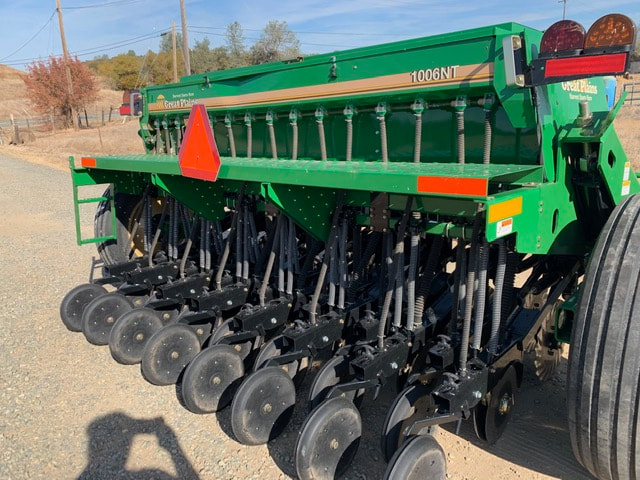Soil Health

WHAT ARE HEALTHY SOILS?
A healthy soil will look, feel, and smell differently depending on your environment and context of your operation. In general, healthy soils have a few things in common: an active microbiotic community, a diversity of living roots, plenty of pores for water to infiltrate, and an abundance of above-ground biomass protecting it from the elements. Each of these components contribute to the productivity of agricultural operations and result in increased water holding capacity and carbon sequestration.












SOIL HEALTH RESOURCES
The websites listed below offer additional resources regarding soil health practices, implementation and current research. Once you click on any of the links you will leave the RCD website.
Savory: Our mission is the large-scale regeneration of the world’s grasslands through Holistic Management to address the global issues of desertification, climate change, and food and water insecurity. savory.global
Regeneration International: To promote, facilitate and accelerate the global transition to regenerative food, farming and land management for the purpose of restoring climate stability, ending world hunger and rebuilding deteriorated social, ecological and economic systems. regenerationinternational.org
Regrarians: Working with producers worldwide to manage and create profitable agricultural landscapes and enterprises. www.regrarians.org
The National Center for Appropriate Technology (NCAT) is a private nonprofit organization, founded in 1976, which manages a series of projects that promote self-reliance and sustainable lifestyles through wise use of appropriate technology. Its programs deal with sustainable and renewable energy, energy conservation, resource-efficient housing, sustainable community development, and sustainable agriculture. attra.ncat.org
Kiss The Ground : Inspiring participation in global regeneration, starting with soil. kisstheground.com
Fibershed develops regional fiber systems that build soil and protect the health of our biosphere. www.fibershed.com
The Quivira Coalition builds soil, biodiversity, and resilience on western working landscapes. We foster ecological, economic, and social health through education, innovation, and collaboration. quiviracoalition.org
Holistic Management has helped thousands of farmers, ranchers and land stewards around the world to create more healthy soil which provides many benefits including: improved water infiltration, carbon sequestration, and wildlife habitat. holisticmanagement.org/healthy-soil
The mission of the non-profit Soil Health Academy is to teach and assist farmers and ranchers in applying time-tested, ecological principles and biomimicry to regenerate our living and life-giving soil. In restoring the health of our soil’s ecosystem, we will restore the health of our bodies, our farms, our communities, and our planet.
soilhealthacademy.org
The Carbon Cycle Institute’s mission is to stop and reverse climate global change by advancing science-based solutions that reduce atmospheric carbon while promoting environmental stewardship, social equity and economic sustainability. The Carbon Cycle Institute (CCI) is advancing this mission through our Ag Carbon Program, which is advancing carbon farming and regenerative rangeland management that builds soil carbon and critical ecosystem services on ranches, farms and working landscapes. www.carboncycle.org/carbon-farming
The Soil Health Institute is a non-profit whose mission is to safeguard and enhance the vitality and productivity of soil through scientific research and advancement. The Institute works with its many stakeholders to identify gaps in research and adoption; develop strategies, networks and funding to address those gaps; and ensure beneficial impact of those investments to agriculture, the environment and society. soilhealthinstitute.org
Regenerative Organic Certification is a holistic agriculture certification encompassing pasture-based animal welfare, fairness for farmers and workers, and robust requirements for soil health and land management. regenorganic.org
Community Alliance with Family Farmers (CAFF) is a non-profit that builds sustainable food and farming systems through policy advocacy and on-the-ground programs that create more resilient family farms, communities, and ecosystems. www.caff.org
CalCAN advocates for policies to ensure the resilience and sustainability for California farms and ranches in the face of climate change. calclimateag.org
The Ecological Farming Association (EcoFarm) is a non-profit educational organization whose mission is to nurture safe, healthy, just, and ecologically sustainable farms, food systems, and communities by bringing people together for education, alliance building, advocacy, and celebration. eco-farm.org
Occidental Arts & Ecology Center (OAEC) trains and supports “whole communities” — schools, public agencies, Native American tribes, urban social justice organizations, watershed groups and others — to design and cultivate resilience to mounting ecological, social and economic challenges. oaec.org
Center for Land Based Learning educates youth on agriculture, business and the environment. landbasedlearning.org
Kitchen Table Advisors fuels the economic viability of sustainable small farms and ranches through practical business advising and trusted relationships. www.kitchentableadvisors.org
Flipping the Table Podcast https://www.rootsofchange.org/tag/flipping-the-table-podcast/
Art of Range Podcast https://artofrange.com/
Soil Carbon Cowboys Video https://vimeo.com/80518559
TECHNICAL & FINANCIAL ASSISTANCE AVAILABLE
The California Department of Food & Agriculture (CDFA) funding is available to California farms and ranches for a variety of practices to build soil fertility and reduce greenhouse gas emissions, while providing economic benefit to the operations. Project awards are available to operations of all sizes: medium and small scale operations are encouraged to apply. The Healthy Soils Incentives Program (HSP) can award up to $100,000 to implement any of the 25 eligible soil health practices, such as: cover crops, compost application, hedgerows, mulching, no-till or reduced till, and prescribed grazing on pasture. If you are interested in applying check out the Healthy Soils Program website. The Amador RCD will be hosting workshops and providing technical assistance to applicants, sign up on the ARCD email list to stay updated. Amador RCD will be available to provide free one-on-one technical assistance through the application period.
Check out CDFA's website for application information, they have also created a video that walks you through the application process.
Questions about Healthy Soils Funding
Contact Anna Mariscal: (209) 217-1051 or anna@AmadorRCD.org

